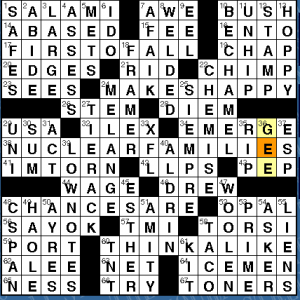Matt Gaffney’s Wall Street Journal contest crossword, “Begin at the End”—Dave Sullivan’s write-up
Greetings once again to our weekly recap of the Wall Street Journal’s contest puzzle. Since we’re in a week that contains an “R” (insert appropriate emoticon here), we have “Mr. Meta,” Matt Gaffney with whom to battle wits. Today, he asks us for a famous novel, so let’s take a look at the theme entries, shall we?- 17a. [Preliminarily, redundantly], FIRST OF ALL – I guess the “of all” is unnecessary
- 24a. [Satisfies], MAKES HAPPY – seems as good as place as any to link to this video
- 38a. [Traditional arrangements], NUCLEAR FAMILIES – or, as W would call them, nucular
- 48a. [Johnny Mathis hit of 1957], CHANCES ARE – I remember his coming out in 1982 was a big deal at the time, glad it’s not so remarkable these days
- 60a. [Great minds may do it], THINK ALIKE – I thought the idiom implied this is a given, not a possibility
Again, we have a meta that hinges largely on interpreting the title correctly. “Begin at the End” sent me looking to the end of each of these entries and first thinking that they could each “begin” another phrase. After that unproductive start, I thought they could read as a phrase from top to bottom, leading us to: 
All happy families are alike
Indeed, author Leo Tolstoy used just this phrase to “begin” his novel, Anna Karenina, which is a very famous novel and our meta answer. Frankly, I didn’t recognize the phrase and had to Google it; I’ve only read his War and Peace, and even that I have yet to completely finish, having about 200 pages to go (the Epilogue part; somehow I think it’s my life’s work to finish it so I’m in no hurry). In terms of famous first lines, “It was the best of times, it was the worst of times” from Dickens is the one that comes first to mind, which sort of parallels the opening to Anna K. in that the line continues:
each unhappy family is unhappy in its own way
Start with the good news and follow up with the bad, I guess. Other points of interest in this one:

- TORSI or “torsos” for [Trunks]? I would use the latter.
- Speaking of the BUSH family, we have brother Jeb referenced in the clue [Carson rival] (admit it, you were thinking TV first, weren’t you?)
- Rather tough entries for me were ILEX, LLPS, and ICEMEN, wondering for the last of these when ice was last delivered to someone’s home (revivals of Eugene O’Neill’s play notwithstanding)? Wouldn’t hockey players (or even curlers?) make for a more contemporary entry?
- [Buzz in the sky] had me thinking of bees, but instead, it’s astronaut Buzz ALDRIN

Loved the simplicity of the meta. The answer popped right out as I was filling in the grid. This is a very famous opening line.
I don’t know why so many people prefer Anna Karenina to War and Peace. I really liked the latter and I was lucky to have a Russian literature professor who marked about 300 pages that we could skip–mostly about the generals and their maneuvers. I’m pretty sure we read the last 200 pages.
How meta is it to contrast reviews of two meta puzzles?
I had a real laugh comparing Evad’s remarks on the WSJ contest, that he had to Google “All happy families are alike,” one of the most famous openings in world literature, to Ben’s discussion of the AV Club contest, in which he took for granted that everyone had several layers of knowledge about the fine points of the Hebrew alphabet and the dreidel, which I had to get from Wikipedia!
(Please do not read any bad attitude into my remarks – just an acknowledgement of the different fields one person or another may be conversant with.)
No offense taken–I freely admit my lack of familiarity with world literature, spending most of my formative education years in front of a computer terminal (or punch card reader before that!). I’m trying to make up for lost time, however; I just finished an 8 week class reading George Eliot’s Middlemarch, which I enjoyed immensely.
Then again, I would have had no clue for either. I am neither well-read (I use dyslexia as an excuse for that), nor well enough versed in jewish customs to have had any idea what was going on.
Not a slam on either puzzle constructor or reviewer, just my ignorance.
I liked this one … but I tend to like all of Matt’s puzzles. I had to Google to get the answer since I never read the referenced book.
My submission email bounced. Any idea if there was a problem at the WSJ end, Matt? I’d believe something was hinky here because the University is changing the mail system around, but I wouldn’t have expected outgoing mail to bounce because of that.